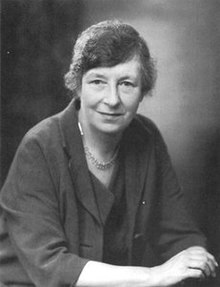
Back آن بيشوب Arabic آن بيشوب ARZ Ann Bishop Catalan Ann Bishop Welsh Ann Bishop German Ann Bishop (bióloga) Spanish آن بیشاپ Persian Ann Bishop French Ann Bishop ID ആൻ ബിഷോപ്പ് Malayalam
Ann Bishop | |
|---|---|
 | |
| Born | 19 December 1899 Manchester, England |
| Died | 7 May 1990 (aged 90) Cambridge, England |
| Alma mater | Manchester University and Cambridge University |
| Known for | Studies of drug resistance in Plasmodium |
| Scientific career | |
| Fields | Biology, protozoology, parasitology |
| Institutions | Girton College, Cambridge |
| Thesis | (1926) |
Ann Bishop (19 December 1899 – 7 May 1990) was a British biologist from Girton College at the University of Cambridge and a Fellow of the Royal Society, one of the few female Fellows of the Royal Society. She was born in Manchester but stayed at Cambridge for the vast majority of her professional life. Her specialties were protozoology and parasitology; early work with ciliate parasites, including the one responsible for blackhead disease in the domesticated turkey, lay the groundwork for her later research. While working towards her doctorate, Bishop studied parasitic amoebae and examined potential chemotherapies for the treatment of amoebic diseases including amoebic dysentery.
Her best known work was a comprehensive study of Plasmodium, the malaria parasite, and investigation of various chemotherapies for the disease. Later she studied drug resistance in this parasite, research that proved valuable to the British military in World War II. She discovered the potential for cross-resistance in these parasites during that same period. Bishop also discovered the protozoan Pseudotrichomonas keilini and worked with Aedes aegypti, a malaria vector, as part of her research on the disease. Elected to the Royal Society in 1959, Bishop was the founder of the British Society for Parasitology and served on the World Health Organization's Malaria Committee.
© MMXXIII Rich X Search. We shall prevail. All rights reserved. Rich X Search